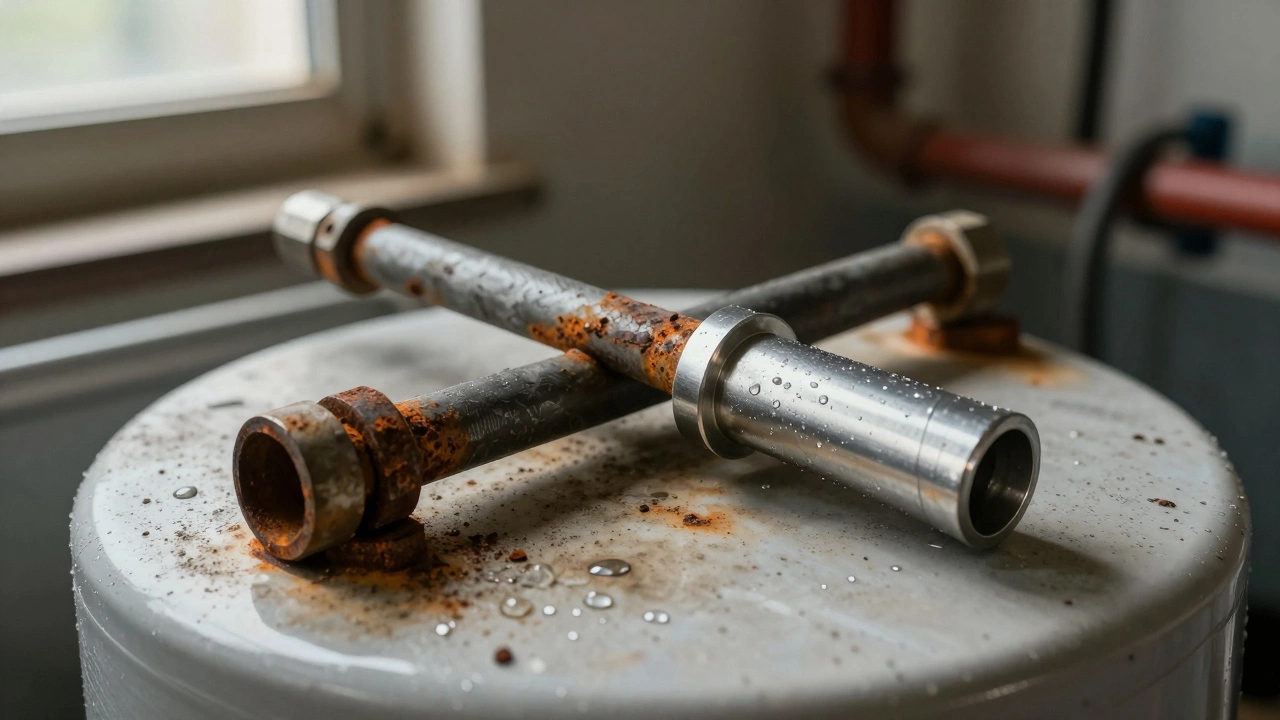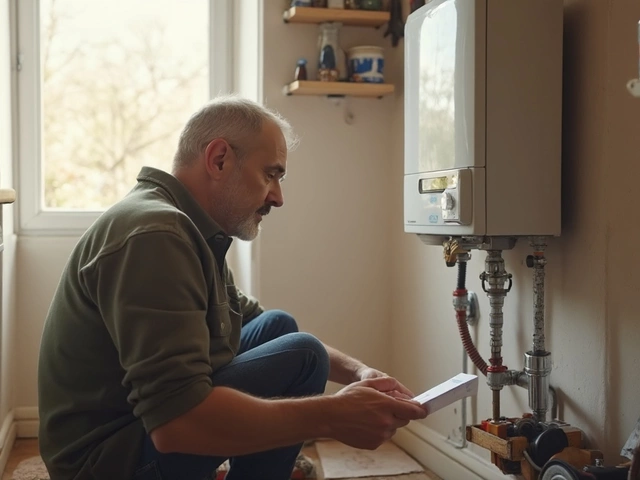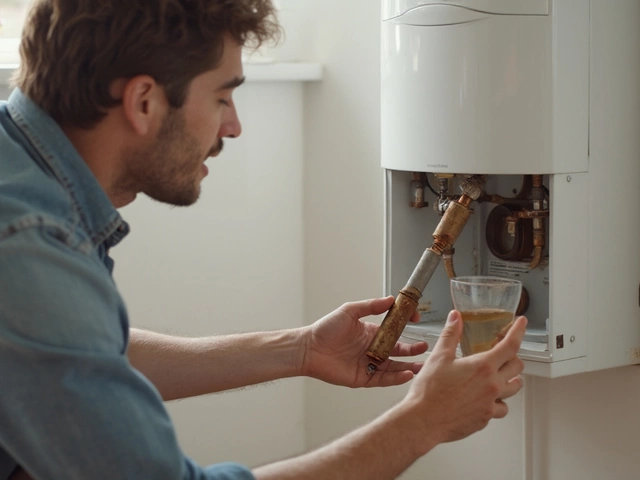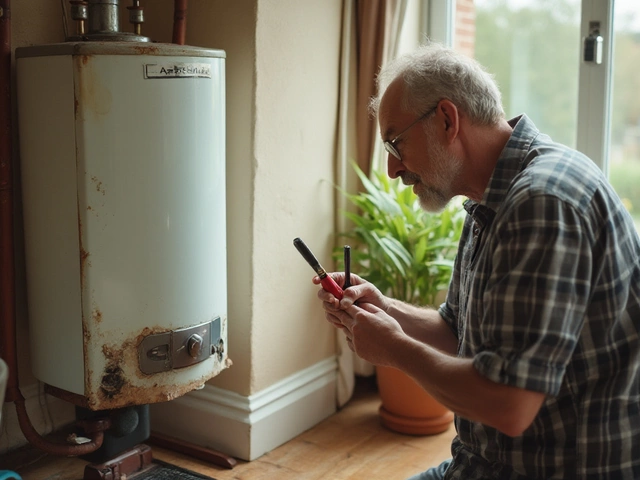Ever wonder why your hot water suddenly feels rusty or why the tank makes strange noises? Most of the time it’s the anode rod giving up. The anode rod is a cheap metal stick that stops corrosion inside your water heater. When it wears out, the whole tank can start rusting, which means costly repairs or a full replacement.
The anode rod is made of zinc, aluminum, or magnesium. It sits right in the tank and attracts the corrosive chemicals that would otherwise attack the steel lining. Think of it as a sacrifice lamb – it corrodes so the tank doesn’t. As long as the rod stays solid, the heater lasts longer and runs more efficiently.
Most manufacturers suggest checking the rod every 2‑3 years, but if you have hard water or a high‑mineral supply, you might need to look sooner. A quick visual check can tell you a lot: if the rod is less than half the original diameter or covered in heavy rust, it’s time for a swap.
Ready to replace it yourself? You’ll need a few basic tools: a garden hose, a socket wrench (usually 1½‑inch), a pipe wrench for stubborn fittings, and a new anode rod that matches your heater’s make and size. Follow these steps and you’ll have fresh protection in under an hour.
1. Turn off power and water. For electric heaters, switch off the breaker. For gas units, set the thermostat to “off.” Then shut off the cold‑water supply and open a hot faucet to relieve pressure.
2. Drain a few gallons. Connect a hose to the drain valve at the bottom of the tank and let a few gallons flow out. This reduces the weight of the water and makes the rod easier to pull.
3. Locate the anode rod. It’s usually on the top of the tank, covered by a hex‑shaped plug. Remove any insulation or plastic caps to expose the fitting.
4. Unscrew the old rod. Use the socket wrench to turn the rod counter‑clockwise. If it’s rusted in, apply a little penetrating oil and let it sit for a few minutes before trying again.
5. Install the new rod. Wrap Teflon tape around the threads of the new rod to ensure a leak‑free seal. Screw it in clockwise until snug, then give it an extra quarter turn – no need to over‑tighten.
6. Refill and test. Close the drain valve, remove the hose, and turn the cold‑water supply back on. Open a hot faucet and let water run until it flows steadily, indicating the tank is full. Finally, restore power or relight the gas burner.
That’s it! By swapping the anode rod yourself, you’ve extended the life of your water heater and saved a handful of pounds. If anything feels too tough – a stuck rod, a leaking connection, or you’re unsure about gas units – call a local pro. A quick call can prevent damage and keep your hot water flowing.
Regularly checking the anode rod is a smart habit. It costs less than a new heater, takes minutes, and gives you peace of mind that your hot water stays clean and reliable.

Replace your water heater's anode rod every 1-2 years in hard water areas to prevent tank corrosion. A simple £20 part can save you hundreds in repairs.

Replacing the anode rod in a water heater can extend its lifespan and prevent costly repairs. This article breaks down the cost of replacement, including materials and labor, and discusses why it's a crucial part of water heater maintenance. Discover how often anode rods should be checked and what signs indicate it's time for a replacement. Whether you DIY or hire a pro, understanding these factors can save you money and stress.

Deciding whether to repair an electric oven after five years can be tricky, especially with advancing technology and evolving household needs. This article explores the practical aspects of oven repair, including cost-benefit analyses, common issues, and DIY tips to help inform your decision. By understanding key factors like repair costs versus replacement options, you can make an informed choice. Learn how to assess the condition of your oven and get tips on when professional help might be needed.

Thinking about handling your own boiler service? Get the truth about what you can and can’t do, why safety matters, and which tasks are okay for homeowners. This article covers legal restrictions, common mistakes to avoid, and practical tips for everyday boiler care. Learn how to spot problems early and when it's really time to call a pro. Save yourself headaches, money, and maybe even a major disaster by knowing the facts.

Not sure if your water heater's anode rod is shot? This article breaks down the telltale signs that your anode rod is past its prime, from weird smells to rusty water. Find out how long these rods actually last, why they're so important, and how to check them yourself. With some simple tips, you'll spot trouble before it wrecks your tank. Get the facts so you can keep hot water flowing without a nasty surprise.

Who pays for boiler maintenance? Landlords must cover it for tenants. Homeowners pay for everything. Warranties don't cover servicing. Annual checks are legally required and save lives.

Water heaters are essential in our daily lives, yet they often fail more quickly than expected. Understanding the common causes of these failures can help in preventing them. In this article, we delve into why water heaters often break down prematurely and offer practical tips on extending their lifespan. Regular maintenance and awareness of common issues are key to ensuring your water heater runs efficiently for years.